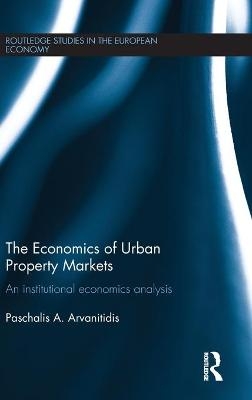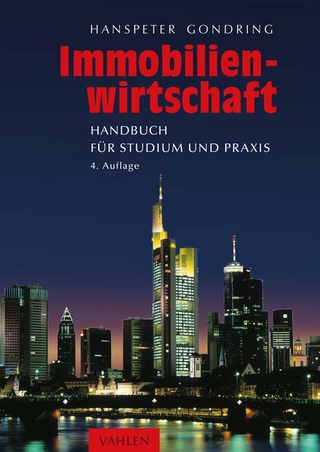
The Economics of Urban Property Markets
An Institutional Economics Analysis
Seiten
2014
Routledge (Verlag)
978-0-415-42682-4 (ISBN)
Routledge (Verlag)
978-0-415-42682-4 (ISBN)
This book examines the relationship between the property market and urban economy. The stimulus for this work was provided by the seemingly ever accelerating process of urban economic change and the noticeable failure of existing studies to adequately explore the pivotal role that the property market plays in this process.
This book examines the relationship between the property market and urban economy. The stimulus for this work was provided by the seemingly ever-accelerating process of urban economic change and the noticeable failure of existing studies to adequately explore the pivotal role that the property market plays in this process.
Drawing on institutional economics, the central argument of the book is that the property market as an institution is a mediator through which urban economic potential can be realised and served. In developing this argument, the book provides a critical realist ontological framework that advances understanding of the institutional structure of the economy and the complex interrelation between the institutional environment and human agency, as well as a holistic theoretical framework of urban economic change, where appropriate emphasis is placed on the specific mechanisms, processes and dynamics through which the built environment is provided. Arvanitidis also explores an institutional conceptualisation of property market efficiency, defined in terms of the ability of the market institution to adapt its structure and to provide outcomes that the economy requires. To inform empirical research on the developed concepts, the book also offers a generic analytical approach specifying appropriate research methods and techniques for investigation along with a specific research design providing an operational framework that translates developed theory into empirical practice.
The book’s primary contribution therefore lies in its delineation of a holistic research programme to conceptualise the property market as an institution and to explore its role within the urban economy.
This book examines the relationship between the property market and urban economy. The stimulus for this work was provided by the seemingly ever-accelerating process of urban economic change and the noticeable failure of existing studies to adequately explore the pivotal role that the property market plays in this process.
Drawing on institutional economics, the central argument of the book is that the property market as an institution is a mediator through which urban economic potential can be realised and served. In developing this argument, the book provides a critical realist ontological framework that advances understanding of the institutional structure of the economy and the complex interrelation between the institutional environment and human agency, as well as a holistic theoretical framework of urban economic change, where appropriate emphasis is placed on the specific mechanisms, processes and dynamics through which the built environment is provided. Arvanitidis also explores an institutional conceptualisation of property market efficiency, defined in terms of the ability of the market institution to adapt its structure and to provide outcomes that the economy requires. To inform empirical research on the developed concepts, the book also offers a generic analytical approach specifying appropriate research methods and techniques for investigation along with a specific research design providing an operational framework that translates developed theory into empirical practice.
The book’s primary contribution therefore lies in its delineation of a holistic research programme to conceptualise the property market as an institution and to explore its role within the urban economy.
Paschalis A. Arvanitidis is Assistant Professor of Institutional Economics at the Department of Economics at University of Thessaly, Greece.
Chapter 1. Introduction Chapter 2. Philosophies And Analytical Frameworks Chapter 3. Urban Development And Property Market Chapter 4. Philosophical Position And Conceptual Framework Chapter 5. The Research Approach Chapter 6. Overview And Conclusions
| Erscheint lt. Verlag | 31.7.2014 |
|---|---|
| Reihe/Serie | Routledge Studies in the European Economy |
| Zusatzinfo | 6 Tables, black and white; 9 Line drawings, black and white; 9 Illustrations, black and white |
| Verlagsort | London |
| Sprache | englisch |
| Maße | 156 x 234 mm |
| Gewicht | 521 g |
| Themenwelt | Naturwissenschaften ► Biologie ► Ökologie / Naturschutz |
| Naturwissenschaften ► Geowissenschaften ► Geografie / Kartografie | |
| Wirtschaft ► Betriebswirtschaft / Management ► Rechnungswesen / Bilanzen | |
| Betriebswirtschaft / Management ► Spezielle Betriebswirtschaftslehre ► Immobilienwirtschaft | |
| Wirtschaft ► Volkswirtschaftslehre ► Wirtschaftspolitik | |
| ISBN-10 | 0-415-42682-0 / 0415426820 |
| ISBN-13 | 978-0-415-42682-4 / 9780415426824 |
| Zustand | Neuware |
| Haben Sie eine Frage zum Produkt? |
Mehr entdecken
aus dem Bereich
aus dem Bereich
Handbuch für Studium und Praxis
Buch | Hardcover (2023)
Vahlen (Verlag)
79,00 €
Erfolgsstrategien für den modernen Immobilienmarkt
Buch | Softcover (2024)
ForwardVerlag
18,00 €
warum Rene Benkos Immobilienimperium zusammenbrach und was dem …
Buch | Hardcover (2024)
FinanzBuch Verlag
22,00 €


